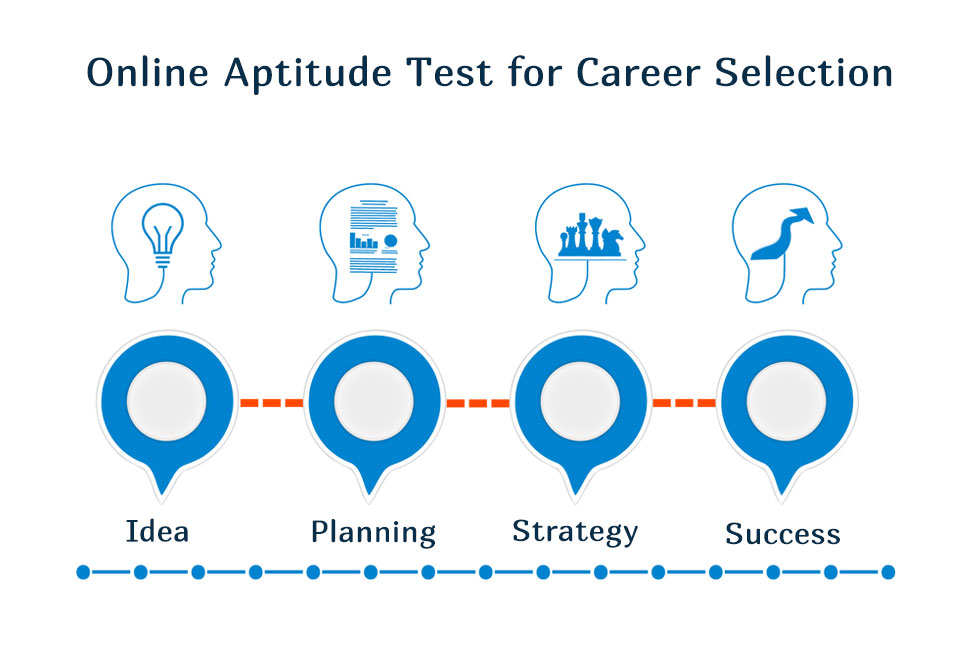Online Aptitude Test for Career Selection
The 21st Century World demands competitiveness in every aspect – be it at your school, occupation, a sports event or just a music contest. Humanity, at its very peak evolutionary period, does not give you any chance to slack or lag behind – if you fall back, you’ll see everyone else behind you getting a thousand steps ahead just in a blink of an eye. So, it is important to get yourself ready for every challenge that will show up to hinder your path of success – or as we can say in Picasso’s words, “Action is the foundational key to all success.”
And we are here to help you out to know about the certain kind of ‘actions’ like what you are best at doing and do it every day – because everybody knows, if you love what you’re doing, you won’t have to work a day in your life!
Career Aptitude Tests, or CATs as we know them, is proved beneficial in many aspects. If sought out at the right time, CATs can help you avoid wrong decisions regarding your future – which, most of the times, are proven to be irreversible.
Career Aptitude Tests mainly consist of a personal interview, a bunch of psychometry tests, a series of interest assessments and a basic conclusion. A more elaborate version consists of IQ scrutinization, psyche-assessments and a real-life assessment where one needs to go through a series of physiological &/or psychological challenges and choose a certain outcome, depending on which her/his ultimate career option(s) are deduced.
Psychometry (the science of deduction and perception) were originally devised by the Chinese to test their civil servants. The process, which literally transcribes to “mind-measurement”, was later adopted by the U.S. and U.K. armies after the two world wars to establish what to do with all their recruits. Till date, psychometrics are the best options to deduce an individual’s mental and behavioral capability.
Psychometry, being the most sophisticated and modern approach towards measuring an individual’s capabilities are now used by almost all top recruiters and corporate firms and are preferred over traditional interviews, references and CV methods, as they provide an accurate idea about an individual’s working capability.
CATs are primarily divided into four parts – one to derive your personality type, i.e. whether you are dominant or recessive, anxious or calm-headed, assertive or compliant, driven or delayed etc. On the other hand, the second part tends to deduce the more practical, logical part of your brain – your response to questions based on certain words, numbers, reasoning and problem-solving techniques, this part primarily depends on knowledge and reasoning; the third one requires to measure your abilities regarding various situations and reasoning you’ve portrayed earlier, mapping up your response and ways to enhance them in a bunch, or individually; the last part includes the measurement of your specific skill set – whether you’re prone to view and do daily chores in an artistic, scientific, calculative or a creative way, assessing the whole result based on what you have a knack on – this includes a wonderful sense of colors, or a distinguished sound calculation, and a business type approach towards non-business matters and how organized you can be while presented with a complicated, messy situation.
The best thing about taking a Career Aptitude Test is that you don’t have to get ready for years to attend them – the whole assessment will be based on your voluntary response and immediate reasoning.
Choose the best option of giving shape to your dreams – whether you’re a student, an experienced professional or just passed out from your college, go, have a CAT & discover your brain’s secret desires unknown to your own self!
Career Aptitude Tests – A Brief Tour

Career Aptitude Tests are the healthiest and most intelligent option to know what suits you the best while you’re still at school – giving you the chance to enhance your capabilities and experience regarding that field. E.g., someone might be more suitable for an artistic, creative career even if she/he opted for science in school, similarly, someone who has been studying with arts subjects could be more suitable for corporate jobs – it all depends on your innermost personality and intuitive choices. There are various types of tests that could be carried out on an individual – some of the important ones include personality tests, psychological assessments and I.Q. derivatives. The whole concept of Career Aptitude Test depends on the theory of psychometry, that transcribes as the measurement of a person’s mind and its limits, assessing an individual’s logical reasoning and thinking abilities. CATs generally consist of multiple-choice questions and are held as proper exams with a limited time frame that generally varies from 60 to 90 seconds per question.
CATs normally depend on the limit measurement of various abilities related to the person’s choice of career, to see whether it suits them the best or are there any better options more suitable for their mental build. There are various types of questions that can be asked in the test, all them based on the multitude of categories, like;
- Verbal Reasoning Ability: Questions regarding spelling and grammar correction, missing words, finding proper synonyms and antonyms, pairing suitable words, paragraph comprehension & sentence reasoning;
- Numeric Reasoning Ability: Questions regarding arithmetic sequences/series, numbers represented by alphabets & data interpretation;
- Abstract Reasoning Ability: Questions regarding subjects that has little to no relation to the tangible world, mainly focused on the understanding and derivation capabilities of an individual, theorized with patterns and figures, calculating the differences and similarities between them with visual reasoning and relating shapes and figures with logical reasoning – these tests generally does not require an educational qualification;
- Spatial Reasoning Ability: Questions focusing on an individual’s ability to draw or derive the meaning of given illustrations – this include shape matching, group rotation, combination, three-dimensional perceptions with mapping and planning.
- Mechanical Reasoning Ability: Questions regarding levers, gears, pulleys, electrical circuits, springs and tools, applied for physical and mechanical reasonings regarding a given situation;
- Fault Diagnosis Ability: Questions testing an individual’s capabilities in finding faults in a given mechanical and/or electronic system, mainly suitable for those who are seeking to work in a technical field.
- Data Checking Ability: Questions testing an individual’s mental precision and agility to find out errors in a given cluster of data that cannot convey any particular meaning – the individual generally has to compare between two or more clusters and choose the one that seems the most accurate one related to the given subject. These tests are mainly suitable for those seeking clerical, administrative, banking or accounting jobs.
- Work Sampling: Questions requiring the individual to complete a given project/task, or submit their own personal work related to the chosen career – the projects will vary depending on specific skill sets required by an organization.
The individual will be given a specific set of questions as designed by the experts to derive the kind of career stream she/he would be more comfortable with, the related set of questionnaires following afterward. Students/Graduates/Professionals everyone is deemed eligible for these tests, and in most of the cases, they are required to prepare thoroughly prior to appearing for the CAT. It is required that the individual has an ample amount of rest and proper nutrition to avoid any uncomfortable circumstance during the test – some tests can be proven quite stressful for nerves, especially for people running low on confidence.

